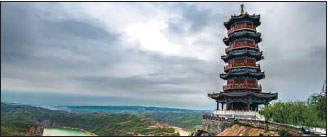Unexpected surprise for travelers
|
A pagoda keeps a solitary watch over the Yellow River far below in a place where it meets the Great Wall in remote Pian'guan.Khalid Sharif / For China Daily |
I made my first visit to China in 2008 and just had a vague idea about its interesting places and tourist sites. Shanxi province, however, which is frequently referred to as an openair museum, was not on my itinerary. In subsequent visits to China, I came to Shanxi many times and realized that the province could indeed attract travelers and even keep them occupied for several weeks.
And this year, I was lucky enough to take part in a China Daily-Shanxi Tourism Bureau event called "Shanxi in the eyes of foreigners", which CD and Shanxi have sponsored several times already.
Shanxi is Chinese for "west of the mountains", meaning the Taihang Mountains. In looking at a relief map of the area, one can quickly see that 75 percent of the territory is mountains. So, obviously, those with a fondness for mountains can definitely have a heyday here.
For popular tourist attractions, Shanxi has Hengshan Mountain, one of China's five sacred Taoist mountains, which has the famous Hanging Monastery, and the Wutai Mountains, a sacred Chinese Buddhist site, which is on UNESCO's World Heritage List. But, it also has the less famous sites, for example, the Mianshan and Luya mountains, which we were able to visit up close.
Mianshan has ancient Taoist and Buddhist temples with precipitous cliffs and hermit caves, as well as picturesque scenery, especially a canyon with a gurgling grassy stream, waterfalls, historical military structures, and clean fragrant air.
Easy to get around
The good transportation and easy accessibility to Shanxi province, especially from Beijing, make it a comfortable trip from the tourist's point of view. It can provide a convenient transit hub for people going on to neighboring Shaanxi province, home of the famous Terracotta Warriors or to Huashan Mountain. Thanks to the high-speed trains, visitors can see such well-known places as Pingyao or the Mianshan Mountains within a day's ride, with a night's stay in the city of Taiyuan.
South of Taiyuan there's an Old Town with its own several-kilometer-long wall - Pingyao - that has managed to preserve its Ming and Qing appearance. It and the temples of Zhenguo (12-km from Pingyao) and Shuanglin (6-km), are also included on UNESCO's World Heritage List.
In traveling across China and visiting its cities, towns, and tourist attractions, or just watching the Chinese, one can't help seeing that it's a country headed toward the future, and nothing in this world can stop it. But, if you want to see both the historical past and the rapidly approaching future in one shot, at the same time, you should visit Shanxi.
The author is a web master at tiwy.com in Russia.















